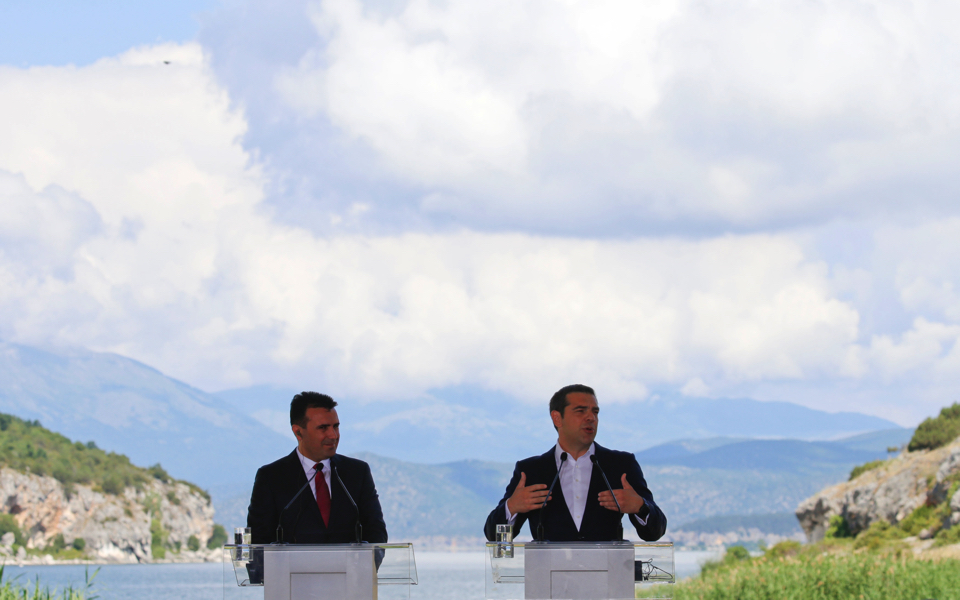The day after the Prespes agreement

White smoke emanated from Psarades, a tiny village in the Prespes Lake district where Greece shares a border with the Former Yugoslav Republic of Macedonia (FYROM), signaling the end of a decades-long dispute between the two countries over the use of the name “Macedonia.” On Sunday, June 17, 2018, the two premiers, Alexis Tsipras and Zoran Zaev, defied protests in their countries and met for a historical appointment, with the former having just survived a no-confidence vote mounted by the opposition in the Greek Parliament the previous night. With ambitious expectations for a new era of cooperation and good neighborly relations, foreign ministers Nikos Kotzias and Nikola Dimitrov signed the accord under which the former Yugoslav republic would be renamed North Macedonia.
The announcement of the agreement gave rise to a range of reactions, in the respective states but also in the European Union, NATO and the United Nations. Domestically, opposition parties rejected the agreement as – more or less – an act of treason. And, if in Skopje the VMRO is widely acknowledged as a deeply conservative party, in Athens New Democracy abandoned (once more) its centrist orientation, adopting the maximalist Greek claims of the early 1990s. One of its vice presidents went even further, tweeting that when ND was negotiating a compound name with a geographical prefix in 2008, it was only to eyewash the EU and NATO.
In contrast, the UN mediator Matthew Nimetz hailed the agreement as a model of problem-solving, and Federica Mogherini, the EU’s high representative for foreign affairs, marked the occasion as a “historic day for the Balkans and for Europe.” Simultaneously, the major European media welcomed the progress as “historic” and “necessary.” This dualism – which comes as no surprise to many – displays the complexity of the problem and the emotions it can excite.
Pending the agreement’s ratification from both parliaments (and a referendum in FYROM), it is useful at this point to make some observations from the foreign policy perspective. The negotiations have shown that, for the first time, both governments had the decisiveness to solve the problem. In the past, politicians either failed to find a good formula or tried to moderate the dispute by keeping the solution on hold. It is understandable for elected officials to avoid the political cost or even invest their careers on the denial of compromise. The new variable here is that the two prime ministers proved to be sincere in their commitment to reach a deal, raising mutual confidence to levels not seen for the last 25 years. The fresh signatures on the accord’s document prove their success.
In addition, the opposition in both countries was more worried about the political damage than their own governments. Focusing on Greece, New Democracy chose to call for a no-confidence vote to block the process, despite the fact that the agreement reflects the objectives as set by the same party when Costas Karamanlis was the prime minister. Nonetheless, politics is hardly as simple as it seems. The opposition challenged the left-wing government hoping that the momentum was good to overthrow SYRIZA by weighing the sentimental backlash against the compromise. The decade-long schism between left and right in Greece, generated by the discourse over the memorandums, revives old hatreds, allowing no room for unbiased dialogue that serves the national interest.
On the other side, the opposition claims that the government handled the issue exclusively, without consulting with the other political parties in Parliament. It is not unusual to keep negotiations far from publicity in order to protect them, but there is no reason not to host confidential meetings with the leaders of the opposition and keep them informed should they need to contribute. In a liberal democracy, the responsibility for foreign policy lies with the executive branch. Even so, it is necessary to pursue an intra-party political consensus or at least open lines of communication for the public benefit.
Last, there is no negotiation – apart from the use of force – that allows one side to leave having satisfied its full agenda. The limited space of this op-ed does not allow for a substantial analysis of the agreement, nevertheless it can be said that the final text has both positive and negative points, with the positive outnumbering the negative. So far, the most prominent analysts in Greece and abroad agree that it is a decent compromise that can possibly stimulate cooperation and constructive coexistence not merely for the two neighbors but for the Balkans as a whole. Of course, critics question the implementation of the accord, especially when it comes to issues of historical and cultural heritage. The answer here can be that carrying through an agreement is not only the responsibility of official agents but also of civil society and ordinary citizens. Up to now it has been a common practice for Greek groups, marketers, students and simple travelers abroad to silently accept the use of FYROM’s constitutional name in international fora. From today there is a new name that comes with certain preconditions holding all interested parties responsible for enforcing them.
This dispute lasted a very long time and prevented progress and friendship for both nations. It is the right moment to learn from past mistakes and walk together toward a better future. For Greece, it is an ideal opportunity to lead the Western Balkans, paving the Euro-Atlantic way for its neighboring state. In this fashion, it must fulfill a strategic imperative, which is to counterbalance Turkey’s penetration in North Macedonia. Apparently, there is much more at stake beyond the name and there is no more time to waste.
Dr Athanasios Grammenos is a political scientist at the University of Macedonia.





